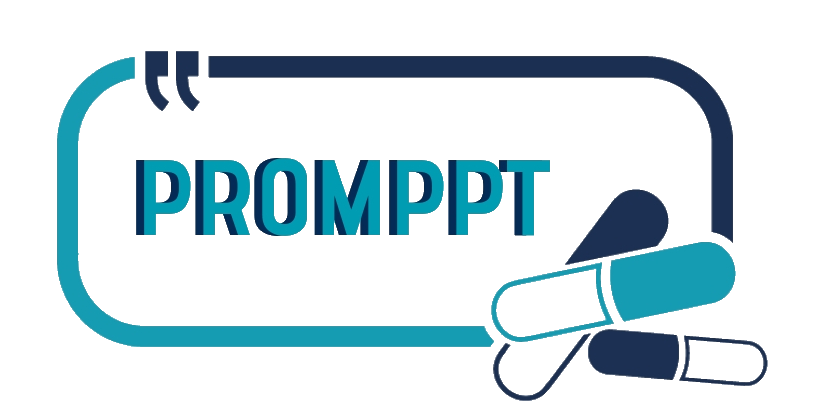How long will a champion provide support to a pharmacist?
- The duration of the support provided to each of the pharmacists will be around 5-months, commencing around the time the e-learning is released to the pharmacist and then for around 3-months once they start delivering the pain reviews.
- There will be 2-3 waves of recruiting pharmacists where new pharmacists will be trained and then supported.
How many pharmacists will the champions support?
- At any one time, we think a champion will support about 1-2 designated pharmacists.
- The research team will try and allocate each champion from within your geographic area (Wessex, E.Mids or W. Mids) but this may not be possible at all times.
How will the champions meet with pharmacists?
- Depending on personal preference of both parties, this could be face-to-face, by phone, or by video.
- There is a designated MS Team for the trial (called PCSC – The PROMPPT Trial – GP practices and Clinical Champions) with a designated channel for participating pharmacists and their GP practice.
- Champions will have access to this team and will have access to the same channels as their designated pharmacist(s) and this is where audio-recordings will be stored. It may be useful to join meetings within this space in order to observe and provide feedback on pain reviews.
- The MS team may be useful for the champions to keep in touch with the practices and pharmacists, but other methods like email, and WhatsApp may also be appropriate at times.
What skills do you already have to support your role?
- We know the champions all have experience of conducting reviews with patients with persistent pain and other long-term conditions, experience of managing patients in primary care, experience of working with different health care professionals within primary care and other relevant settings.
- The champions also have experience of learning through reflection and of supporting others in their learning.
- In addition, some of the Champions have experience of working on the PROMPPT research programme before. Whether an individual champion does or does not have prior experience of working on PROMPPT before does not take away the breadth and depth of experiences that each of the champions will have. All of which are an asset to PROMPPT and to the participating pharmacists.
How will becoming a champion contribute to professional development?
- Being part of PROMPPT, champions may find themselves using leadership skills, validating as well as enhancing existing pain management and behaviour change skills. They may also see things from a different perspective (raising self-awareness).
- Champions will be joining the PROMPPT research programme training team. Champions may find out about how complex interventions are developed and evaluated within primary care settings.
- Their involvement may help shape your own future practice and of the services in which you routinely work.
How will champions be supported?
- The champions will have access to the pharmacist e-learning and this champion training throughout their time as a champion. The participating pharmacists will not have access to the champion training.
- There will be a group induction session, where all the champions will meet each other, talk about the role, practice conducting pain reviews and providing feedback.
- Online meetings will be scheduled about monthly with a member of the research team, at a mutually convenient time and format (2 champion – 1 research team, or 1:1 as needed)
- Champion: Champion “buddy” support
- Within each of the three areas (Wessex, E. Mids, W. Mids), champion buddies will work together to support their allocated pharmacists, and this will be especially important to allow for some flexibility, for example for champions to take leave as and when needed.
- We’re not sure how this will work and it’s likely that it depends on the preferences (and availability) of both the champions and the pharmacists
What about if there is a problem between the champion and the pharmacist?
- A challenge may come up between the champion and pharmacist, in which case consider some of the following tips:
- Understand the challenges faced by the pharmacist
- Re-visit the role of clinical champion and the expectations of the pharmacist of that role
- Understand the challenges faced by the pharmacist in meeting these expectations
- Explore possible solutions to those challenges faced and agree a way forward
- “Good” feedback should be:
- Timely: Given at the best time for the pharmacist to be ready to receive it
- Given on things can be changed, eg the way the pharmacists apply the PROMPPT skills and the steps that make up the pain review and not the pharmacist (nor the patient)
- About a clear focus or aspect of a pain review feedback (jointly decided at the start of a case discussion)
- If needed, use your buddy champion to help explore the challenges and find solutions. And/ or use the research team for support (outside scheduled meetings if this is what is needed)
What happens when things aren’t going to plan?
- We know that things don’t always go according to plan. Things come up and life gets in the way
- If needed, use your buddy champion to help explore the challenges and find solutions
- And/ or use the research team for support and this can be outside of scheduled meetings if this is what is needed

